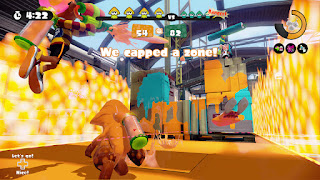Metroid Prime Hunters
As a mid-2000's handheld sequel to a legendary console game, I expected Metroid Prime Hunters to be a neutered imitation of the game that inspired it. In regards to its formula, that's exactly what happened, but I was actually quite surprised by how much I still enjoyed myself while playing it. There are a lot of spin-off games that claim to be canon in their respective series, but can easily be passed up. While it takes place between the first two numbered Metroid Prime games, I still expected to feel that way about Hunters before I played it. Now that I've finished it, I think it's important enough that I actually find myself wishing for a port to the Nintendo Switch so other people can play it before Metroid Prime 4 debuts.
Whether it was because of hardware constraints or a genuine consideration for the short play-sessions that are typical of handheld gamers, Metroid Prime Hunters makes a few big concessions from the usual Metroid formula. Other than a set of special weapons, Samus starts the game with every ability she'll have for the rest of the game, so the only obstacles she'll need to backtrack to are colored doors that open with a specific weapon. The term backtracking is even a little inaccurate, as there are multiple separate locations to explore instead of the usual interconnected map, requiring Samus to return to her ship whenever she needs to fly to a different place. While these differences do change up the structure of the experience, I was continually impressed at how the game still felt like Metroid Prime from start to finish.
Samus may never get the coolest abilities from the console games, but enough of the staples like the morph ball and the scan visor have been translated perfectly to the small screen. I can't speak to the GameCube original, but running, jumping, and shooting as Samus seemed like it was ripped straight from my time with the Switch remaster. I stuck with the button controls, rather than the more precise touch controls, which left me yearning for the lock-in ability that made combat so tight in the first Metroid Prime, but my lack of precision was only really a problem in the boss fights. However, the boss fights had other problems that showcase how repetitive the game can get.
Metroid Prime Hunters was clearly designed for a bite-sized approach to play. Virtually the whole game follows the same pattern. You land your ship in an area, find three keys hidden behind puzzles, platforming challenges, or combat scenarios, use the keys to teleport to a boss fight, beat the boss, then race back to the ship before a timer reaches zero. There's always a teleporter back to the ship at about the halfway point so you can go back to save, there are only four main areas and each is visited twice, and there are only two types of bosses besides the unique final boss. Thankfully, only the repeating bosses got on my nerves. The rest of the game is full of unique environments and clever puzzles that kept me engaged. I particularly appreciate the use of morph ball sections and spats with other bounty hunters to mix things up now and then. More variety could only have helped, but as it's technically one of the earliest games in the DS's lifespan, I'm still wildly impressed with what we got.
While its importance to the series can be debated for a variety of reasons, I would absolutely recommend it to any Metroid Prime fan. The overall experience may be different from the rest of the series, but the moment to moment gameplay feels exactly like it should. The technical wonder of putting such a close imitation of a GameCube series on a relatively underpowered handheld is itself worth at least giving the game a try. I didn't have high expectations when I started my playthrough, but I was thoroughly impressed by Metroid Prime Hunters, and I hope that it will be made much more accessible someday.
Although the game is no longer being distributed, you can learn more about it here (as of 6/26/24): https://www.metroidwiki.org/wiki/Metroid_Prime_Hunters
Photos sourced courtesy of https://www.nintendolife.com/games/ds/metroid_prime_hunters/screenshots




